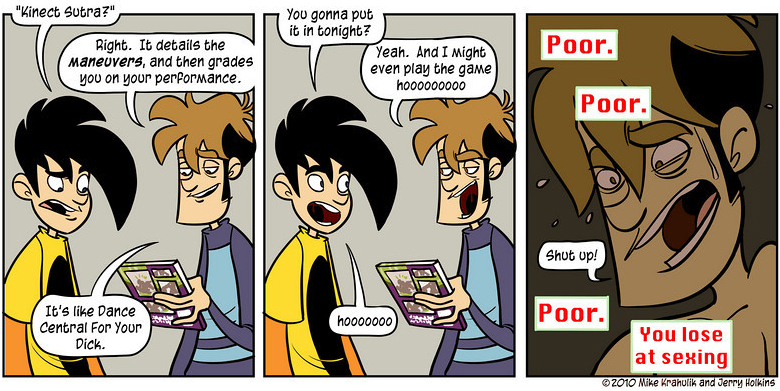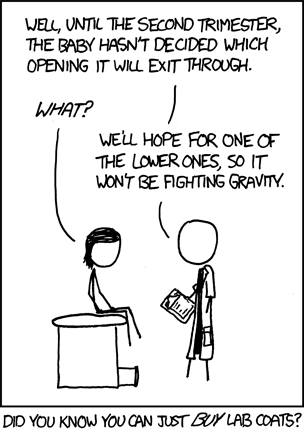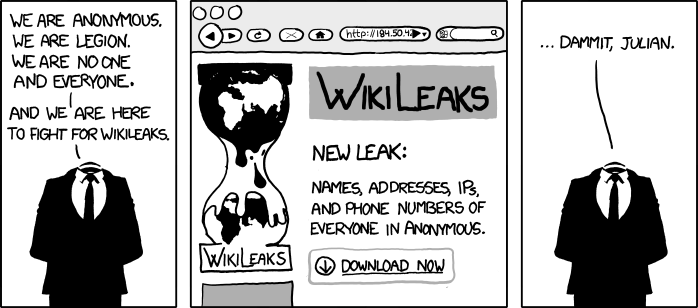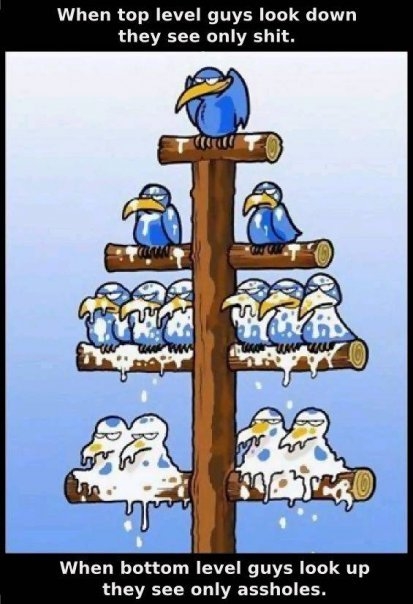This post contains outdated information. I only remove harmful content and try to keep old posts visible — even if they're embarrassing. I want to look back and see my growth over the years, and don't want to hide it from others. Thanks for considering this as you read. (comment or contact me to request an update about its subject matter)
It’s been my observation over the last several years that lawmaking and social development are extremely similar to game design. You’re trying to create a balanced and fulfilling environment for all participants. You’re trying to eliminate exploitation that could give anyone an unfair advantage within your system. You don’t want anyone to even think your system is unfair. You don’t want your customer service lines lighting up with complaints.
When implementing laws, they must also be enforced. When a player breaks a rule, a quality assurance tester should find this problem and point it out to developers that can then close off the opportunity for that rule to be broken. If the rule involves something more socially harmful, then a moderator or game master will suspend or ban that user’s account.
At the end of the design process, it’s important to realize that you will never create something that absolutely everyone will like.
2025: This is the main reason this analogy hasn’t held the test of time for me since writing this. You can’t design an involuntary social system the same way you design a voluntary one. Minorities can’t just be disregarded as the eggs broken to make the omelets. (Not in a just system, at least)
Taxes
Taxes are a necessary evil in any large civilization. Public services must be financed somehow and everyone uses some of them. And hey, for us Americans, someone has to pay for all these illegal and unprovoked wars we wage, right? 🙄
In online games with built-in economies, taxes are taken out of the system to help maintain balance and to prevent the highest level players from having complete control over the in-game markets. They do this by offering premium content (like flying mounts in WoW) for high in-game currency prices. These funds are basically destroyed instead of being sent back and forth between players. This helps reduce inflation as well, as less money is in circulation.
Incentives
In game design, negative consequences are given to players that don’t play in the desired manner. A hundred chickens run out and attack you if you hit any single chicken too many times in Zelda for example. When your character dies in Final Fantasy XI, it loses a large chunk of experience points. When you try to take a shortcut through the poison marshes in Dragon Warrior, it deals damage to your characters. The list goes on and on.
Taxes fulfill this function in American society in some ways. We don’t want people to drink constantly, so we tax alcohol. We want to clean up the environment, so we give tax breaks to people who drive hybrid cars. We apparently only want rich people to have healthy food, so we subsidize the unhealthy stuff to make it cheaper.
Few people would say they enjoy paying taxes. There’s a near-universal feeling of dread to look at your paycheck and see just how much of it is being taken away. Simply because you chose to be productive and have a job. This negative consequence being given to a positive social action (employment) seems to encourage people not to work. Add to that the fact that the government will pay you to be unemployed and you have a very odd game design going on.
2025: I don’t know how I said this stupid shit after being unjustly fired and needing to move through the social security system in a right-to-work red state for months while recovering from an on-the-job injury. Maybe I was used to barely getting by financially with a defaulted student loan, bouncing from rented room to rented room, and leaning heavily on my girlfriend. Maybe it was just a just world fallacy thing where I internalized the idea that I was just a fuck-up. (I wasn’t)
As much as I hate the rich getting richer, the estate tax that might be starting soon (it will tax large inheritances by between 35% – 50% I believe) would create a game state where the government will have a vested financial interest in rich people dying. 🤣
Healthcare
In video games, you can generally sleep off any injury with a quick trip to an inn. Or you’ll find first aid kits with anything you need to get better just scattered throughout the world. Sometimes you have to buy your own med packs, nights at the inn, potions, stimpacks, (etc.) but they’re rarely expensive. And there’s no insurance paperwork minigame each time.
You don’t get refused service if your injuries are too severe — which is especially surprising considering the injuries you suffer in these games are things like demon possessed, ripped in half by a sarlac, or falling off a floating island 30,000 feet above ground level. The prices are never so exorbitant that you couldn’t pay your bill given a little bit of work. There are no middle men, no prescriptions, no insurance companies, no credit scores, and no lawyers.
This makes video games a healthcare utopia, even if they’re filled with diabolical villains, enormous monsters, terrible ghosts, and invading aliens all seeking to destroy the world. These things will most likely never be possible in our real world, but it’s definitely an indication that simplicity is a much better answer than complicating healthcare further by adding the government to the mix and subsidizing insurance companies.
2025: An idea championed by The Heritage Foundation and first implemented by Mitt Romney.
Our current healthcare system creates a game state where doctors, pharmaceutical companies, and insurance companies are better off when people are sick and unhealthy. It creates a motivation for these powerful people to wish poor health on everyone to maximize profit. That is how they gain advantage in the game and how a delicate balance falls apart.
Why don’t people go to the gym? Why don’t they eat healthier foods? Why don’t they go to the doctor immediately when something happens to them? “It’s too expensive” or “I don’t have time” because we’re working constantly for low pay. If this were a bug report to a gaming forum, the fix would definitely not be force every player to pay monthly in case they get sick. It’d be to rebalance wages and/or the cost of medical care to make preventative care more accessible. Attack the cause, not the symptom.
2025: I obviously underestimated the political power of the insurance industry. And while I still agree with the intent here, I’m a bit more aggressive now. I believe as the very first step we need to abolish for-profit insurance of all kinds — especially health.
Economics
In many video games with multi-player economies, it’s easy to trace where money is changing hands. In Final Fantasy XI, you could see who was using real money to buy in-game currency just by searching the auction house for junk items being successfully sold for extremely high amounts. In World of WarCraft, you can see the buyer and seller of everything that’s ever gone through the auction houses. In many games, you could even look up a specific character to see everything they ever bought or sold.
This creates an atmosphere of transparency, and thus an informed public. When everyone knows how much everything is selling for and who has it, they can make informed decisions in their trading. They can prevent themselves from being ripped off or having someone take advantage of them. This prevents the market from falling into the hands of the few in secret. I know several guys that could tell me off the top of their head how much gold their new sword is currently worth, but have no idea how their 401k is invested.
Derivatives trading has turned the stock market into even more of a casino. Some people would say the lack of regulation was the reason for the economic collapse, but I submit that the lacking factor is transparency. We don’t need small groups of easily influenced government officials drawing a salary from our taxes to oversee the markets, when we could easily demand transparency through our laws.
If every bank had to release their investment portfolios and accounting practices within 30 days of the action taken, the public would be better able to regulate where they spend their own money. They’d be able to pull their money from banks that invest in immoral corporations. There would be traceable accountability for every market drop. They’d be able to spot illegal activity easily.
There will always be people who don’t put in the effort to look into things, but the glass house will force banks to invest intelligently and morally or face public relations nightmares and losses in business. There is no good excuse for secrecy anymore. If a bank wants to stay competitive, they’d have to be agile to adapt to the actions of other banks.
2025: 🤣 What a fucking idiot. Everyone knows how corrupt the 1% are. We just have little power to do anything about it. More transparency wouldn’t hurt, but it isn’t a solution. And how are we supposed to enforce transparency laws without “government officials drawing a salary” to do it? This is some pre-DOGE idiocy. I apparently didn’t know the SEC already existed, and I definitely overestimated how important ethical investment is to the average American.
Religion
Most games that have a religion or religions involved in them eventually show that they’re silly. In some cases (Breath of Fire 2), the deity everyone worships ends up being truly evil. In these societies, the followers of said religions are often good people who’ve been tricked. I don’t find this to be far from the truth, but I’d like to see games take a more realistic approach in this sense.
Most religious people I’ve met have aligned themselves with their religion of choice not out of blind faith, but because that religion is the most compatible choice with their personal morals and beliefs. Others choose a religion based on a preacher they relate to, or a community they want to be part of, or because they desire some direction to follow or avoid. I’ve yet to find a video game character that relates to their beliefs in a realistic way and I’d like to see this happen.
I suspect when the rules of Catholicism were first created, they were in the spirit of furthering society in a positive direction. They designed rules they felt would send us into an age of prosperity and personal fulfillment. For example, not allowing sex before marriage was their way of making sure children had two parents and were provided for. I happen to find these laws outdated.
I’m not sure why God would have a problem with AIDS sufferers using condoms with their partners. I can’t think of any reason this would be good design. We live in an overpopulated world and our natural resources are wearing thin. Perhaps we should consider telling everyone that God thinks contraception is not only perfectly acceptable, but a good thing and handing out condoms to anyone who wants them.
2025: We do not live in an overpopulated world. We live in a world where a small number of people who hoard everything want the rest of us to blame each other for why we don’t have enough.
For that matter, perhaps religion should encourage homosexuality. Homosexual relationships are no different than heterosexual ones, except that they’re adopting children instead of adding to the population. If God were to pronounce all of his homosexual children to be blessed, it might make the world a better place. Maybe we can change “be fruitful and multiply” to “be fruity and pair off”.
Also, it’d be hilarious to see if any holier than thou types suddenly try to become gay just so they have a better shot at heaven. We’d see what they think about the whole homosexuality being a choice thing then.
On a side note, I’m okay with the United States being called a Christian nation if we actually practiced the Christian ideals I grew up with. This would mean providing for the needy (Socialism, OMG), turning the other cheek (no war), and having Jesus kicking some moneychanger ass.
Recent Events
When I drive on a highway in Maryland, I see signs everywhere that say “See Suspicious Activity? Call 1800-Snitchgasm”. The only time I ever saw signs like this before was is in movies and video games with overstated tyrannical government oppression (V for Vendetta, 1984, BioShock), or a post-apocalyptic setting (Children of Men, Fallout 3). Which of these is Maryland?
Whenever I hear someone say “WikiLeaks is a terrorist operation” it reminds me of the same things. This means the word terrorist has lost all its meaning. Instead of taking drastic action to cause widespread public fear, the definition now meets the same fate as the word communist did: “anyone the corporate and corrupt leaders of government deem inconvenient.”
Anything that can be destroyed by the simple truth…
P.C. Hodgell
deserves to be.
Throughout history, old farts in power have had trouble adapting to new technology. Whether it was Nixon saying insanely stupid things on tape, Blagoyevich selling a senate seat on tape, or countless senators emailing sexually explicit things to pages, these guys just don’t get it. Their vain attempts at secrecy all splinter and fall apart as technology becomes more widespread. Technology is an instrument of the people. It’s a weapon in the fight against the secrecy and corruption that’s ever-present in our elected officials.
The internet has to stay neutral for us to keep our only source of fact checking, real news, and free expression alive. Our government will never become transparent on its own. We have to force them to be open and honest with us. Until we can do this, we need sites like OpenLeaks, WikiLeaks, and truthout to pull open the curtain.
These are things our press should be doing for us, but they have become corrupted and saturated by the powerful few as well. If we continue to fight for the people that are trying to help us, perhaps our media will see the light and actually give us the real news.
2025: “Technology is an instrument of the people” seems so laughably naive now. 😔 This whole section is so depressing.
The Path of Least Resistance
When designing a level in a video game, the general principle for guiding your players through it is giving them as much freedom as possible and counting on them to eventually take the path of least resistance. It’s human nature to seek out the fastest and easiest route to success. By designing a system where the path you want them to take in their adventure is the one that seems the easiest and fastest, you’ll have the greatest control over their experience and be able to keep them from getting lost.
To some, the path of least resistance means searching the game’s rules and grey areas for secrets and exploits to “cheat” their way through. These are the people that use the Konami code and purchase Game Genies. These are the same ways some people look at our legal system. They abuse loopholes and technical imperfections in the law to give themselves unfair advantages over others. We call these people lawyers.
2025: No, we call these people capitalists. Lawyers and politicians just do the dirty work they direct — which still sucks, but they’re not the root cause.
Lawyers operate in a world of cheating normal citizens out of what they deserve. They do this with their own secret language that only other lawyers can decipher. They do it by intentionally creating confusing wording in laws once they’re elected. Like morally corrupt programmers, they provide themselves with hidden backdoors to exploit later. We need to use the same diligence for perfecting our laws against lawyers as we do protecting our games from cheaters.
If we want our citizens to go through their lives safely, happily, and successfully, we would want to design a system where it’s as easy as possible for them to follow that path while still giving them the freedom to explore. This means using taxes and subsidies. This means adding and removing red tape from various processes. This means giving the public all the accurate information it needs to make choices. Making things illegal doesn’t work, because then you’re taking away the person’s right to choose, which will undermine their respect for authority.
2025: Making only one narrow path (ex: the nuclear family) and trying to funnel everyone down it makes a shitty game too. I don’t think past me would disagree with this, but it needed to be clarified.
When you look at many of our policies and how they relate to motivating and discouraging certain actions in American society, it seems we need some good game designers in Congress. We need the laws to be simple enough for anyone to understand. We need the laws to motivate people toward positive behavior and discourage the negative without removing freedoms. We need to promote good design in our laws and stop making compromises and politically comfortable decisions. We need to make the correct design decisions.
I invite you all to take a game — or book, or movie, etc. — and look deeply into what we can learn from it as a society. What kinds of problems do we have that the societies in our fiction don’t? What problems do they have that we might in the future? Creative simple solutions are the answer 99% of the time. Let’s find some together.
2025: Ah, the confidence of youth with no actual expertise.
The disaster we’re living through today is exactly what I was naive about here. A country run by a bunch of coders who think society’s problems are all solved by removing complexity in favor of simplicity.
Had I been born 15-20 years later, I might be working for DOGE right now. That humbles and embarrasses me, but it also continues to show how insidious these old ideas are. We keep letting capitalists repeat deregulation myths to us over the generations, and we keep falling for it.













